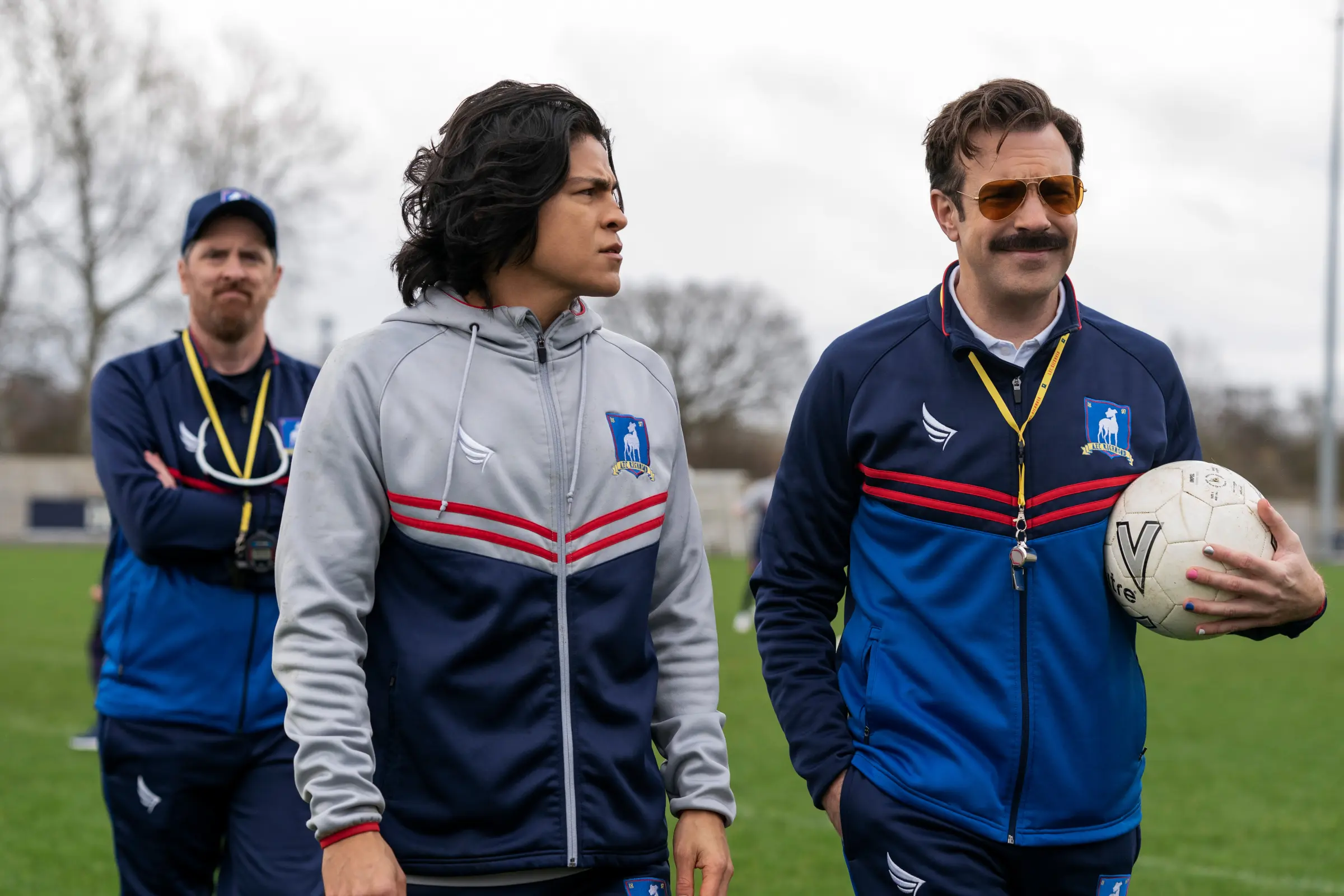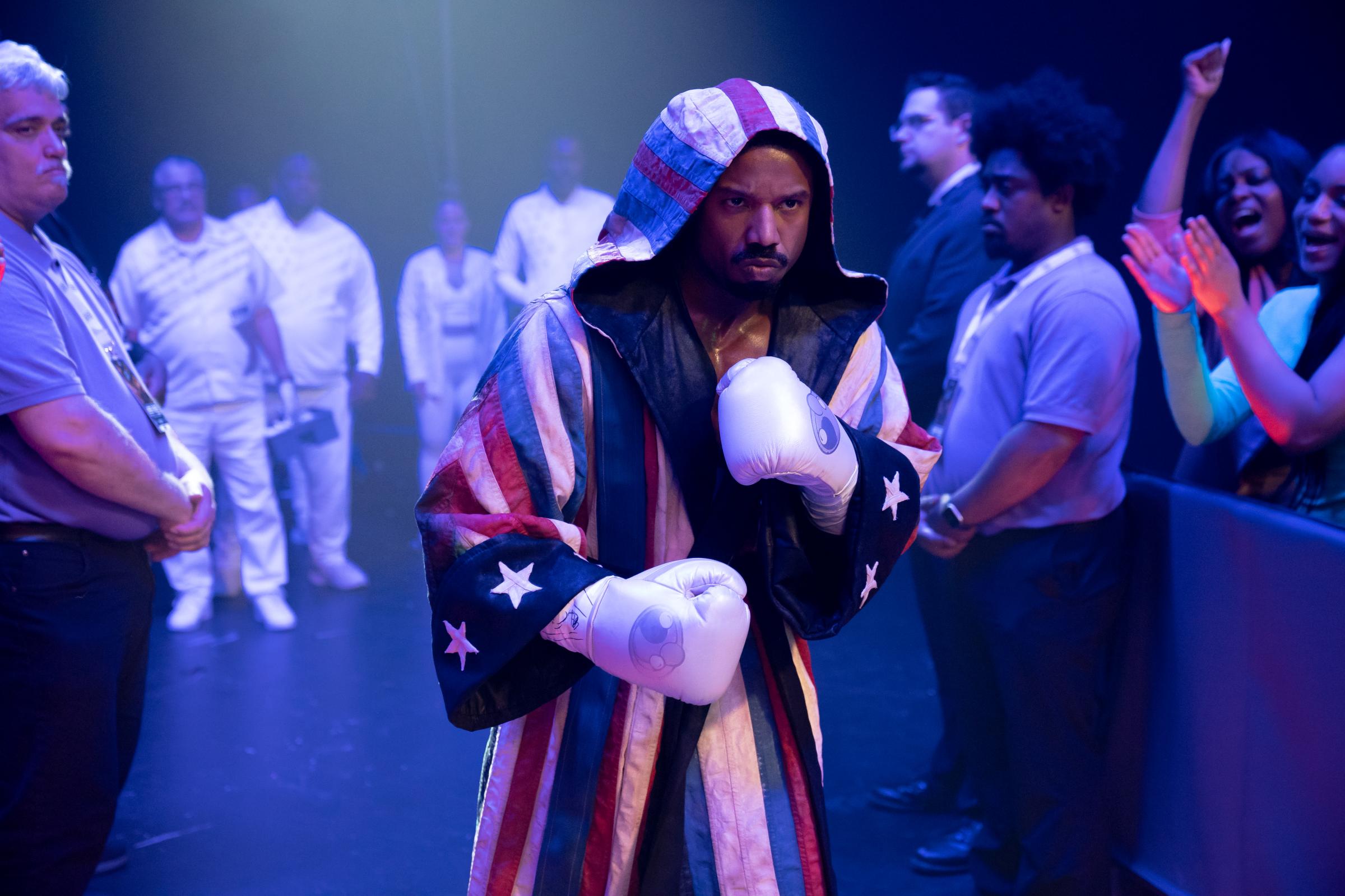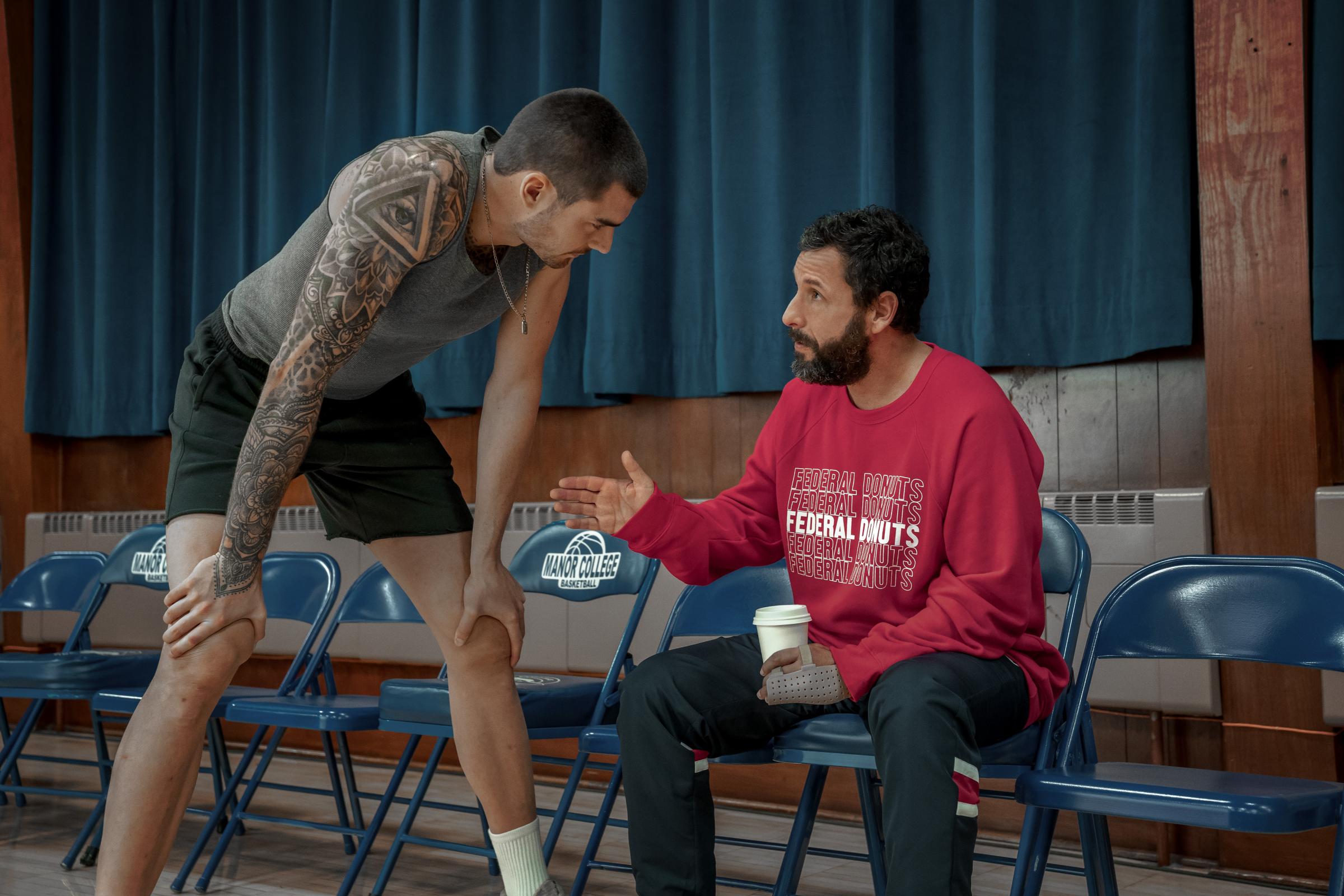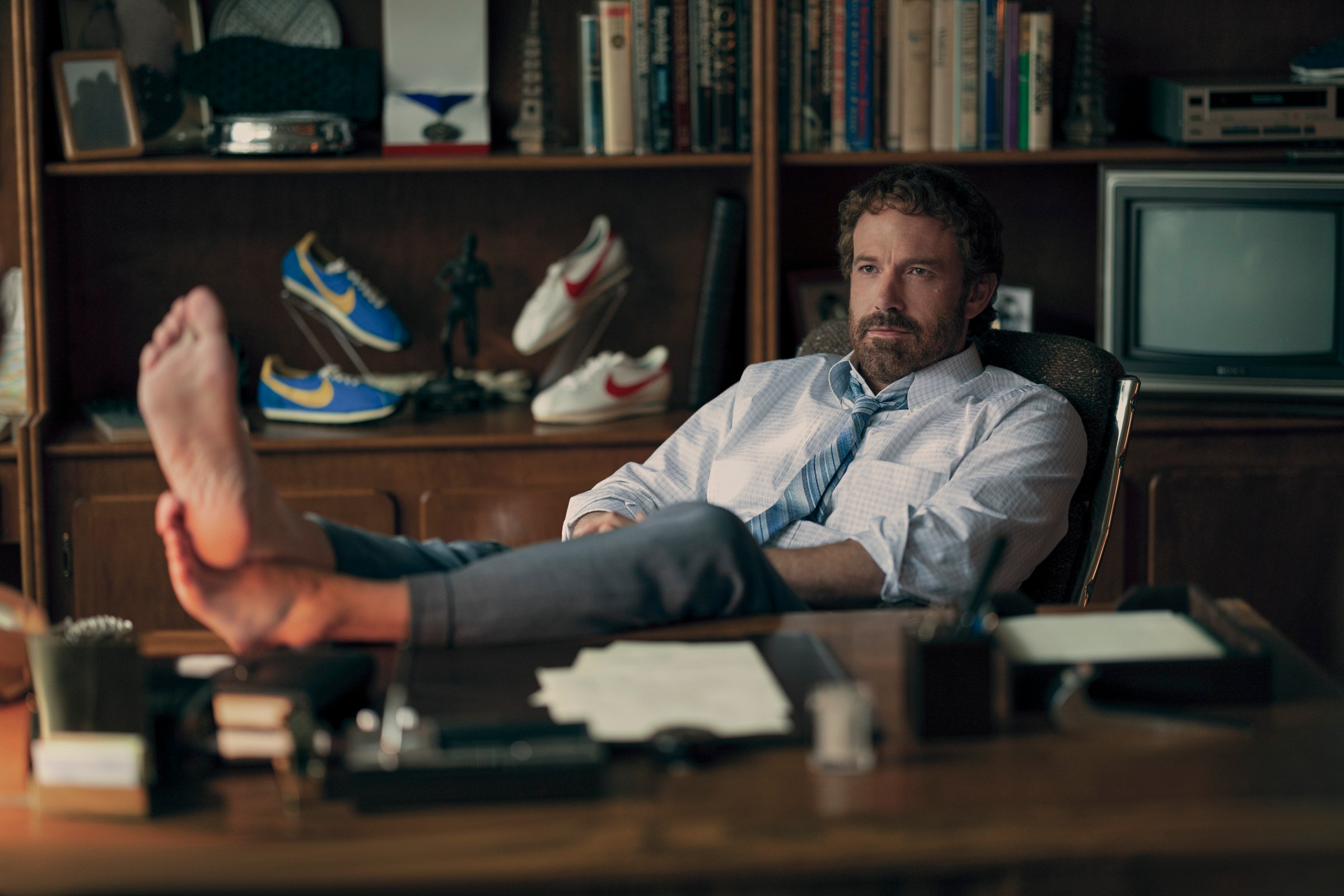Sports movies are back, baby. For a stretch in the ’70s, ’80s, ’90s, and even ’00s, sports movies were inescapable. Beginning with Rocky, feel-good tales of triumph became reliable box office juggernauts. Motivational underdog sagas attracted the whole family. And whether the coach of a sports team was inspirational (Remember the Titans) or irascible (A League of Their Own), he was usually played by a big movie star (Denzel Washington or Tom Hanks—ever heard of them?).
Commercially successful movies about athletes often doubled as Oscar bait: Jerry Maguire, The Blind Side, and Seabiscuit all made over $100 million and scored Academy Award nominations. And then there was the entire subgenre poking fun at the self-seriousness of sports movies—Caddy Shack, Dodgeball, Talladega Nights. Let’s not forget about the romantic sports movies—Bull Durham, Bend it Like Beckham, Fever Pitch—or the tragic sports movies—Million Dollar Baby, Foxcatcher, Rudy.
But somewhere on the flip side of The Blind Side, the sports movie all but disappeared. Sure, we’d get a movie like Creed or Moneyball every few years. But those were the exceptions. Like the rom-com and the adult drama, the sports movie belonged to a class of mid-budget film that seemed destined to languish on the heap of detritus left behind after superheroes smashed up the box office. Iron Man kicked off the MCU in 2008 and by 2012 when The Avengers debuted, sports movies took a backseat. Disney (which owns Marvel) released the Jon Hamm baseball flick Million Dollar Arm in 2014, a movie that had such a disappointing box office return that it seemed to scare the studio that gave us Air Bud, The Mighty Ducks, and Miracle from putting similar stories in theaters indefinitely.
The 2010s marked a nadir for the genre. In their greedy pursuit of films featuring inexplicably jacked characters in tights who use all that physical power to do little but shoot laser beams at one another to save the multiverse, studios set aside the all too human athletes who use their strength to achieve much humbler goals. Studios dedicated larger and larger budgets to comic book movies and offered smaller sums to sports films.
But change is in the air. This year’s box office has been dominated by athletes as much as superheroes. As Ant-Man and the Wasp: Quantumania and Shazam: Fury of the Gods floundered at the box office, Creed III and 80 for Brady proved to be first-quarter hits. Ahead of its release this week, Ben Affleck’s Air has scored a 99% on Rotten Tomatoes and generated buzz that may just propel its director-star through awards season. Sure, Air, a movie about a billion-dollar company designing a shoe, is more sports-adjacent than some of these other titles. But the cheers at the obligatory montage of Michael Jordan’s careers highs and lows in my screening of the film would seem to indicate that people were there to see MJ as much as Matt Damon.
And the rest of the year is chock-full of movies about competitors: Zendaya has a sports movie coming out (tennis). So do Michael Fassbender (soccer) and Adam Driver (racing). This may just be the year of the sports movie’s glorious return.
How did we get here?

How to explain this sudden course change for Hollywood? Perhaps during the pandemic, studio executives tuned into Netflix’s gigantic hit of a docuseries The Last Dance about Jordan’s historic run with the Chicago Bulls and remembered that sports are compelling and dramatic and full of delicious trash talk. (We know for a fact that Air screenwriter Alex Convery actually got the idea for Air while watching the fifth episode of The Last Dance.) Those same executives could have tuned into another huge pandemic hit, Apple TV+’s soccer dramedy Ted Lasso, and remembered that the wins and losses of sports function as rather heartwarming metaphor for the human condition. It could be that, before all the Will Smith drama, King Richard reminded Hollywood that the Oscars love a sports movie.
Read More: How Air Tells the True Story of Michael Jordan’s Nike Shoe Deal
But several new sports movies have been in development for years, long before Jason Sudeikis grew his Ted Lasso mustache. So maybe, just maybe, filmmakers sensed we were getting sick of superheroes and wanted our normal, run-of-the-mill heroes back. Filmmakers determined to bring back sports movies have contorted them to fit into the new Hollywood landscape where there’s little room for anything but middle-brow streaming shows and comic book movies. And they found three main ways to do this: by cloaking a new story in old IP, finding a streamer with the ambition to make movies like they used to, or trotting out the old Academy Awards playbook.
Path 1: The tangential franchise

As writer-director Ryan Coogler told me way back in 2015, the original Creed film was born from the love for the Rocky franchise that he shared with his father. But given that studios only seem to greenlight sequels and spinoffs these days, one can’t help but wonder whether a studio would have ever greenlit an original boxing movie from Coogler without any ties to a known cinematic hero. Three movies in, Creed III has become what we might call a tangential franchise. Technically, it still belongs to the Rocky universe but has distanced itself so far from the original IP that Sylvester Stallone doesn’t appear in the film, and Creed III never actually plays the iconic Rocky theme song. And yet Creed III still set a franchise box office record its opening weekend. At this point Adonis Creed does not need Rocky Balboa in his corner in order to succeed.
We might also slate the upcoming Gran Turismo, out Aug. 11, into the “tangential franchise” category since it’s building off the success of the video game of the same name. It has a bizarre spon-con sounding premise: It’s centered on a kid who becomes a race car driver after winning a Nissan-sponsored video game competition (presumably on a Sony Playstation given that the film is being made by Sony). But it stars David Harbour and Orlando Bloom, and Neill Blomkamp, who made the very good District 9, is directing it.
Could other new franchises blossom from the dusty remains of old ones? Perhaps. Given studios’ ongoing reliance on familiar stories and characters, it’s frankly mind-boggling we haven’t gotten more modern updates like Creed.
Path 2: The streamer strategy

OK, that’s not entirely true. Studios are rebooting and sequelizing a lot of sports movies. They just wind up as television shows on streaming services. A League of Their Own, Mighty Ducks, and White Men Can’t Jump all recently got television treatments (or soon will).
But streamers seem willing to occasionally invest in original sports films that harken back to an era when the genre could find both critical and commercial success. In Netflix’s Hustle Adam Sandler plays an NBA talent scout who takes a player under his wing before the draft. Not only did it feature legitimate NBA stars (who made for surprisingly good actors), but it got enough buzz that it earned Sandler a Screen Actors Guild Award nomination. Netflix also purchased High Flying Bird, a Steven Soderbergh basketball drama shot entirely on an iPhone that got awards attention.
I suspect that Ben Affleck and Matt Damon would take umbrage with the idea that Air, the story about the creation of the Air Jordan shoe, is primarily a streaming title. In fact, it’s the first movie from Amazon Studios to get a wide theatrical release since 2019. But Amazon bought that movie because it’s exactly the sort of inspirational movie that families will watch over and over again at home.
Path 3: The Oscar play

The Academy Awards have a long history of awarding sports movies the top prize: Chariots of Fire, Rocky, and Million Dollar Baby won Best Picture. The Hustler, Raging Bull, Jerry Maguire, The Blind Side, and The Fighter have all taken home statues too. Just last year King Richard finally won Will Smith his Oscar.
Lately, the Academy has been loving feel-good films about family: Those themes are about the only commonality shared between the last two Best Picture winners, CODA and Everything Everywhere All At Once. And here’s the thing about sports movies: They’re often feel-good tales of triumph that tend to center on either literal families or a team that acts like a family.
Read More: Creed III Is the Kind of Movie the Big Screen Was Made For
And next year may prove the most sports-centric Oscar ceremony ever. It seems to be the subject du jour for Oscar-winning or Oscar-nominated directors. Affleck, who helmed Best Picture winner Argo, has Air; Taika Waititi, who got a nod for Jojo Rabbit, is directing Michael Fassbender in the soccer movie Next Goal Wins; Luca Guadagnino, who broke onto the awards circuit with Call Me By Your Name, is helming a Zendaya tennis film called Challengers; and Michael Mann, nominated for The Insider, is releasing the racing film Ferrari starring Adam Driver.
We’ll have to wait some months to tally up the box office totals and awards hauls to see what the future may hold. But for now, at least, we can revel in the glory of those sweaty training montages and slow-motion game-winning shots.
More Must-Reads from TIME
- Cybersecurity Experts Are Sounding the Alarm on DOGE
- Meet the 2025 Women of the Year
- The Harsh Truth About Disability Inclusion
- Why Do More Young Adults Have Cancer?
- Colman Domingo Leads With Radical Love
- How to Get Better at Doing Things Alone
- Michelle Zauner Stares Down the Darkness
Write to Eliana Dockterman at eliana.dockterman@time.com
